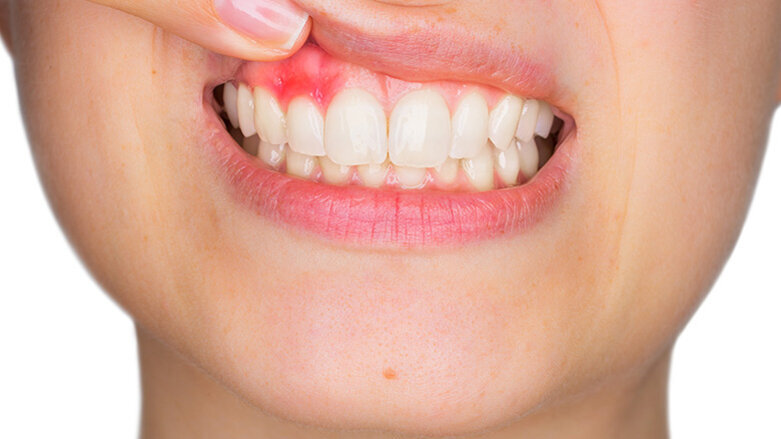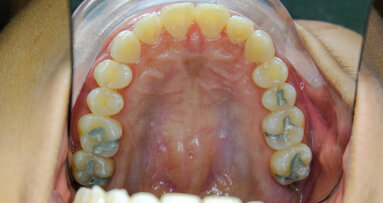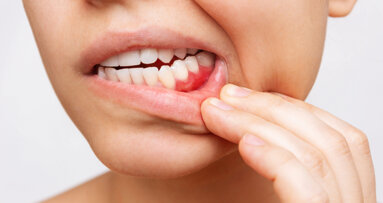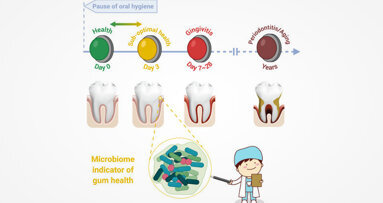AARHUS, Denmark: The effect a high-sugar diet can have on teeth is well documented; however, the effect it can have on periodontal health has not been as widely studied. Recently, researchers from Aarhus University’s Department of Dentistry and Oral Health investigated 50 years of clinical data and research and concluded that a sugary diet can also promote periodontal disease.
Speaking to Dental Tribune International, lead researcher Prof. Bente Nyvad said: “I got the idea by reading the thought-provoking paper by Hujoel published in the Journal of Dental Research in which he discusses the relationship between dietary carbohydrates and dental–systemic disease.1 In this paper, Hujoel promoted the old papers by Cleave, ‘The saccharine disease’,2 and Yudkin, ‘Pure, white and deadly’.3 From there, I searched the common databases to add more recent literature. Our new hypothesis was formed by incorporating all the existing relevant literature into a new paradigm.”
The link between a high-sugar diet and periodontal disease seems quite obvious; however, according to Nyvad, the reason it has taken so long for more detailed research to be done can be put down to several factors. She said: “Researchers have the bad habit of reading only the literature that pertains to their field. When they read something that does not fit into their way of thinking, they tend to ignore it, possibly because new ideas may not make sense to them. In our case, we incorporated the old literature into a new paradigm after having done extensive literature reviews. I come from the field of cardiology. Maybe that made it easier for me to deviate from old established concepts in periodontics.”
Despite the early success of Cleave’s and Yudkin’s work, shortly afterwards medical doctors shifted the blame from dietary sugars to fat as the primary causative factor in inflammatory disease. This might be one of the reasons that the research was largely forgotten, according to Nyvad. She said, “Some people think this happened because of manipulation by the sugar industry. Only more recently, the pendulum has shifted back to a strong focus on easily fermentable sugars.”
In the study, Nyvad noted that, contrary to conventional wisdom, excessive intake of fermentable carbohydrates might contribute to inflammation in periodontal tissue as a result of hyperglycaemia. Commenting on this, she said that, for more than half a century, dentists had been taught that bacteria are the leading cause of gingivitis and other periodontal diseases. However, this new study shows that, after reading the literature critically, there is substantial evidence that dietary sugars are modulatory factors in the development of periodontal disease.
“For example, Baumgartner et al. demonstrated that elimination of refined sugars from the ‘Stone Age diet’ reduced the severity of gingival inflammation over a period of four weeks without oral hygiene.4 We have also learned from studies of experimental gingivitis that Type 1 diabetics may develop an earlier and higher inflammatory response than non-diabetics to a comparable bacterial challenge. Therefore, there are strong indications that hyperglycaemia is involved in the disease processes, although the exact pathogenic mechanism remains to be clarified.”
With more and more focus within dentistry going into prevention, this new study is just another reason for dentists to be clear with patients about the importance of a well-balanced diet. Nyvad continued: “Periodontal diseases are multifactorial diseases. If dietary sugars are an important cause, as we suggest, dentists will need to include sugar control as a preventive measure to combat these diseases in the future. Up until now, dentists have mainly instructed their patients to perform improved oral hygiene to cure periodontal disease. This may explain why some patients have not always responded well to the treatment.”
Nyvad concluded that sugar restriction dose not only benefit the teeth, but could also have a positive effect on several common sugar-driven inflammatory diseases, such as diabetes, obesity and cardiovascular disease.
The study, titled “Integrated hypothesis of dental caries and periodontal diseases”, was published on 7 January 2020 in the Journal of Oral Microbiology.
References
- Hujoel P. Dietary carbohydrates and dental-systemic diseases. J Dent Res. 2009 Jun;88(6):490–502. doi: 10.1177/0022034509337700.
- Cleave TL. The saccharine disease: conditions caused by the taking of refined carbohydrates, such as sugar and white flour. Bristol: Wright; 1974. 200 p.
- Yudkin J. Pure, white and deadly: the problem of sugar. London: Davis-Poynter; 1972. 164 p.
- Baumgartner S, Imfeld T, Schicht O, Rath C, Persson RE, Persson GR. The impact of the stone age diet on gingival conditions in the absence of oral hygiene. J Periodontol. 2009 May;80(5):759–68. doi: 10.1902/jop.2009.080376.
Tags:
LONDON, UK: Though the exact number of people who suffer from xerostomia is unclear, some studies estimate that as many as one in five of the population ...
SINGAPORE: Moving from a limited focus on the environment to recognising the importance of health, well-being and prosperity of people and the planet, the ...
In 1978, Kuraray shook up the dental market with the introduction of CLEARFIL BOND SYSTEM F, the world’s first total-etch adhesive system. Having ...
SAN JUAN, Puerto Rico/SPRING, Texas, U.S.: Mercury in dental amalgam is a hidden source of global mercury pollution, resulting from factors such as the ...
KUOPIO, Finland: A large Finnish population-based study has assessed periodontitis using salivary biomarkers—rather than clinical and radiographic oral ...
QINGDAO, China: Most adults experience episodes of gingivitis, which can progress to periodontitis, yet the role of plaque in gingivitis onset and ...
BLOOMFIELD, Conn., U.S: Cigna, a worldwide health services organization, has recently released a study that helps confirm the connection between oral health...
HALLE (SAALE)/LEIPZIG, Germany: A new approach to the treatment of periodontitis could make the use of antibiotics obsolete, as it targets only the bacteria...
BILBAO, Spain: While the systemic health implications of neuropsychiatric disorders are well recognised, their connection to poor oral health—in ...
MALMÖ, Sweden: Tooth loss, the final outcome of periodontitis, has previously been associated with an increased risk of cardiovascular diseases. A study ...
Live webinar
Tue. 24 February 2026
1:00 pm EST (New York)
Prof. Dr. Markus B. Hürzeler
Live webinar
Tue. 24 February 2026
3:00 pm EST (New York)
Prof. Dr. Marcel A. Wainwright DDS, PhD
Live webinar
Wed. 25 February 2026
11:00 am EST (New York)
Prof. Dr. Daniel Edelhoff
Live webinar
Wed. 25 February 2026
1:00 pm EST (New York)
Live webinar
Wed. 25 February 2026
8:00 pm EST (New York)
Live webinar
Tue. 3 March 2026
11:00 am EST (New York)
Dr. Omar Lugo Cirujano Maxilofacial
Live webinar
Tue. 3 March 2026
8:00 pm EST (New York)
Dr. Vasiliki Maseli DDS, MS, EdM



 Austria / Österreich
Austria / Österreich
 Bosnia and Herzegovina / Босна и Херцеговина
Bosnia and Herzegovina / Босна и Херцеговина
 Bulgaria / България
Bulgaria / България
 Croatia / Hrvatska
Croatia / Hrvatska
 Czech Republic & Slovakia / Česká republika & Slovensko
Czech Republic & Slovakia / Česká republika & Slovensko
 France / France
France / France
 Germany / Deutschland
Germany / Deutschland
 Greece / ΕΛΛΑΔΑ
Greece / ΕΛΛΑΔΑ
 Hungary / Hungary
Hungary / Hungary
 Italy / Italia
Italy / Italia
 Netherlands / Nederland
Netherlands / Nederland
 Nordic / Nordic
Nordic / Nordic
 Poland / Polska
Poland / Polska
 Portugal / Portugal
Portugal / Portugal
 Romania & Moldova / România & Moldova
Romania & Moldova / România & Moldova
 Slovenia / Slovenija
Slovenia / Slovenija
 Serbia & Montenegro / Србија и Црна Гора
Serbia & Montenegro / Србија и Црна Гора
 Spain / España
Spain / España
 Switzerland / Schweiz
Switzerland / Schweiz
 Turkey / Türkiye
Turkey / Türkiye
 UK & Ireland / UK & Ireland
UK & Ireland / UK & Ireland
 Brazil / Brasil
Brazil / Brasil
 Canada / Canada
Canada / Canada
 Latin America / Latinoamérica
Latin America / Latinoamérica
 USA / USA
USA / USA
 China / 中国
China / 中国
 India / भारत गणराज्य
India / भारत गणराज्य
 Pakistan / Pākistān
Pakistan / Pākistān
 Vietnam / Việt Nam
Vietnam / Việt Nam
 ASEAN / ASEAN
ASEAN / ASEAN
 Israel / מְדִינַת יִשְׂרָאֵל
Israel / מְדִינַת יִשְׂרָאֵל
 Algeria, Morocco & Tunisia / الجزائر والمغرب وتونس
Algeria, Morocco & Tunisia / الجزائر والمغرب وتونس
 Middle East / Middle East
Middle East / Middle East












































To post a reply please login or register